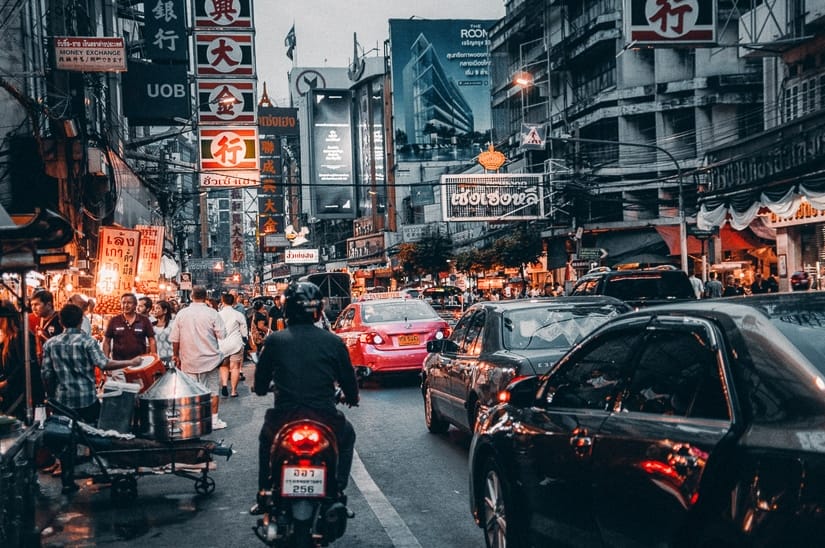Dear reader: This article contains links to products and services that I may be compensated for, at no extra cost to you.
By Danny Newman
Staying present is a key skill for any traveller to develop.
The more I reflect on it, the more I come to see the discipline of mindful travel as the only way to reap the full rewards on offer, whether you are traveling alone for the first time, or a veteran world wanderer.
That’s a big statement. So, let me try to explain…
See my related articles on meditation for travelers and yoga for travelers.
Table of Contents
The Benefits of Present-Moment Focus and Mindful Travel
The present moment is a magical fragment of time that constitutes the here and now. To remain situated in it will help you make the most of your time on the road. Here’s why:
· Presence is to be free of worry, grounded in the reality around you and unconcerned with the trivialities of life.
· Presence is to be aware of, focused on, and available to whatever circumstance arises in the environment at large.
· Presence allows experience to be absorbed and entered into fully.
· Presence evokes a feeling of connection. Unity with experience reigns where disconnect, apathy and indifference can otherwise prevail.
· Being present with travel helps you embrace and remember the experience. That’s especially important considering that travel is usually transient in nature.
Hopefully those benefits of being present while you travel have convinced you of its importance. For anyone who remains unconvinced, I’ll carry on…
An Example of Presence in Action While Travelling

Entering into the present moment is like turning the WiFi on.
Suddenly, there’s access to something outside of you. Ironically, in real terms, it often takes turning the actual WiFi off to become present in the moment!
To illustrate my point, here’s a scenario I invite you to imagine.
You’re sitting on a beach. It’s the beach you always dreamed of while suffering through those endlessly long, dreary days at work or uni. Now though, free at last, you’ve swapped the desk chair for a deck chair.
The sun shines high in the sky above you. Light glints from the crests and troughs of the surf that laps rhythmically nearby. The air is warm but not uncomfortably so. A breeze blows gently across the bay, cooling you down and rustling the palm fronds that sway over head. Heat shimmers the sand in the distance, rising in waves and blurring the lines of sea, sand and sky into a hazy combination of contorted colours. The atmosphere is one of varying shades of blue and gold.
The remnants of the freshly cut coconut purchased from a beachside vendor sits in the sand at your side, close to hand. A book, bought at the airport, rests half read on your chest as you gaze through weary eyes and tinted sun glasses at the other oiled and tanned beach dwellers that sunbathe, swim and generally enjoy the day around you. You rest your head back on your backpacking pillow, and breathe a sigh of relief.
It’s just how you’d imagined it.
Except you’re not actually there.
The whole time this perfect scene unfolds you’re ruminating over the incident on your last day at work, when you heard two colleagues bad mouthing you around the water-cooler.
You can’t remember whether you filed that confidential document properly, or if it’s still on top of the photocopier. Did you lock the house door properly behind you and shut all the windows?
What about the bank—did you tell the bank you were going away, or are they going to cancel your card when they see all these foreign payments?
Then there’s the stack of emails that will greet you on the computer upon your return, or the meeting with your boss you’ve scheduled to discuss a pay raise.
It goes on like this and before you know it the sun’s gone down, clouds have come and it’s a little chilly. It’s late and you’re hungry, so you get some food at a restaurant. But before you know it, the same thoughts have trickled back and you’re sitting and eating a beautiful plate of food in the same mindless, disconnected manner that you experienced on the beach.
Experiences that could, and perhaps should, have been prioritised get irrevocably lost to a mind stuck in past and future.
Though we’re present in a physical sense, the pesky little monkey mind that’s constantly tick tick ticking away is plonked firmly back at home, amongst the stresses of work and daily life.
The Experience of Presence

It’s important not to beat ourselves up about this.
Our brains are simply doing what they have evolved to do- that is, to protect us from harm.
Thousands of years ago, this same capacity to stop, think and fear would have spared the hapless caveman meeting a premature demise at the jaws of a sabre tooth tiger. It was (and is) helpful.
Though the environment (and the challenges that went with it) has changed dramatically since then, this neural programming remains. The consequence? That incessant internal chit chat and worry that loosens our grip on the present moment.
We know what gets lost, but what do we stand to gain by staying in the moment?
Really pay attention though and the environment takes on an impressive novel form, as if seen through with a new filter.
Colours enhance, lines focus, and shapes take on a new form- tiny details become obvious and striking.
Of course, these are just symptoms of being aware of what’s external to us. Presence also has the potential to reveal our true thoughts and emotions, which can easily be lost or occluded otherwise.
The Trouble with Presence…

Presence isn’t easy. We’re so used to being ‘absent’ that presence is difficult to sustain.
However, it definitely improves with practice- it’s a skill. You may only get a fleeting break from those internal workings, but this is a good start. Hopefully it will whet your appetite for more.
Over time, you come to recognise when you’re anywhere but the present moment. At that moment you can decide whether to continue on the current path, or bring yourself back to the present. It is a process that gets easier over time.
Equally, the aim isn’t to be constantly present.
Indeed, like a caveman walking inadvertently into the jaws of the sabre tooth, being present isn’t always what a situation calls for. Far better to stop, think and plan for the potential danger.
It’s the balance we’re after, and the capacity to recognise our thinking and claw ourselves back, when that’s the most appropriate thing to do.
When you travel, it’s unlikely you’ll be willing and able to be present all the time.
You’ll often be tired, which never helps. Equally, there’s a level of thought and preparation that’s necessary to stay safe and well on the road.
However, for every moment where it’ll be beneficial to be lost in thought, there will probably be ten where presence would be a preferential state—especially as presence/alertness is often a vital ingredient in the recipe of staying safe while travelling.
Mindful Travel is Within Grasp
Ultimately, the joy of travelling is that it lets you write the script.
Stay present, or don’t.
Just know that it often takes a mental step back to achieve a creative leap forward.
And, where the benefits of presence are so abundant, I’d argue that being present can be a hugely positive practice in anyone’s adventure.
Some days are easier than others. Presence isn’t always possible. Sometimes it’s easier to resign yourself to thought. But, wherever possible, take active steps to root yourself in what’s actually happening, in the here and now.
Let us know how it goes! What did you notice when you were truly present while travelling?
Drop a comment below!
About the author

Danny Newman is currently writing and travelling his way around the world in a bid to figure out exactly what he’s doing with his life. He’d love you to follow along with his journey over at What’s Danny Doing.


